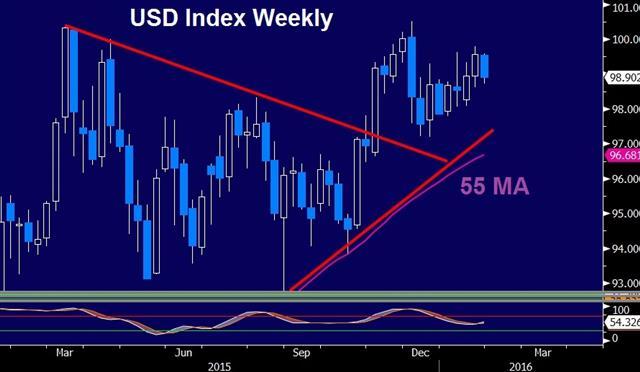What Markets Say is more Important than what Fed Says
The Fed offered several dovish hints in the FOMC statement revealed Wednesday but it wasn't enough to satisfy markets. The Australian dollar was the top performer while the kiwi lagged. The NZD softness came after the RBNZ hinted at more cuts. A new Premium trade has been issued after the Fed statemeny, ahead of Thursday's UK Q4 GDP release, with charts and tech/flow rationale.

The Fed delivered a dovish FOMC statement. Realistically, it was the biggest nod they could give markets without completely backtracking on the long-held hawkish bias. The Fed was incorrect to hike rates in December but this is a signal that they won't repeat the same mistake, unless markets cooperate.
Omissions & Edits
The Fed removed a line about growth expanding at a 'moderate pace', warned that breakevens were falling further and explicitly said they were closely monitoring global economic and financial developments. More important was what they left out. The line on risks being balanced was removed and a reference to being 'reasonably confident' about inflation returning to 2% was cut.That final point is particularly telling because getting to a 'reasonably confident' point was a struggle for the Fed. Removing it was a clear indication the Fed doesn't plan to hike in March.
What's more telling today was how markets reacted. We often say that how markets react to news is more important than the news itself. This was good news and markets still didn't like it.
Analysts often like to fit the news to the market moves and some are even calling this a less-dovish-than-expected statement. It wasn't. This should have been good news for risk trades. Instead they faltered and that argues for more trouble ahead. It may only be a late day blip and real money could spark a reversal tomorrow and that's something we will watch closely.
The other divergence we continue to monitor is oil. Crude rose 2.3% Wednesday and yet stocks declined more than 1%. For the past month, the positive correlation has been very tight and we expect that to continue as junk bond market fears remain.
The other central bank in the headlines was the RBNZ as rates were held unchanged at 2.50%, as expected following the December cut. RBNZ's Wheeler also underscored global markets and economies as areas for concern. The statement added the line that 'further policy easing may be required over the coming year,' along with some anti-NZD jawboning.
The focus now shifts to Japan and retail sales. The recent trade data underscored that FX weakness has not been the cure-all for economic woes that Abe envisioned. That's a lesson Japanese officials may be learning as they allow the yen to strengthen. The health of the consumer is today's concern with December retail sales due at 2350 GMT. The consensus is for a 1.0% m/m gain.
| Act | Exp | Prev | GMT |
|---|---|---|---|
| GDP (Q4) (q/q) [P] | |||
| 0.5% | 0.4% | Jan 28 9:30 | |
| GDP (Q4) (y/y) [P] | |||
| 1.9% | 2.1% | Jan 28 9:30 | |
Latest IMTs
-
USDJPY Jumps on Dovish Picks
by Ashraf Laidi | Feb 25, 2026 11:40
-
Gold $5000?
by Ashraf Laidi | Feb 24, 2026 14:21
-
DXY Net Longs
by Ashraf Laidi | Feb 23, 2026 14:20
-
Iran Polymarket & Fed Odds
by Ashraf Laidi | Feb 20, 2026 11:27
-
Gold, Iran & Oil
by Ashraf Laidi | Feb 19, 2026 16:40







